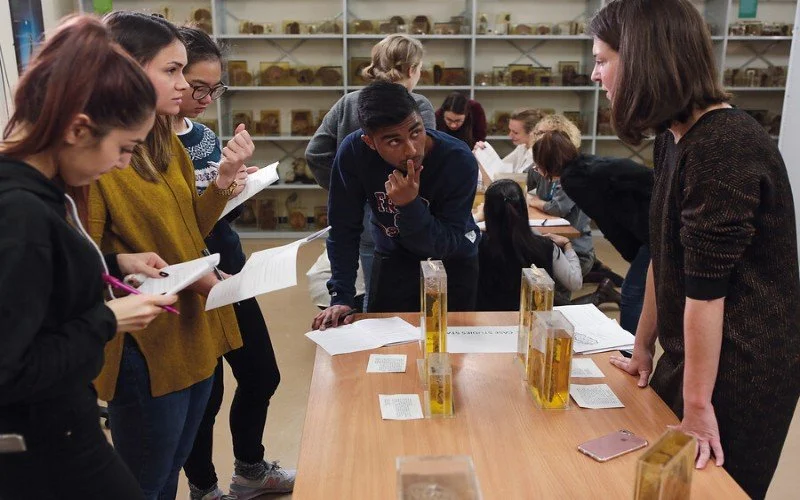The costs of being a PGTA at UCL: Should teaching assistants be paying tuition for the hours they teach?
Photo Courtesy of: UCL Postgraduate Teaching
It is quite common for Ph.D. students at UCL to take on extra work as Post Graduate Teaching Assistants (PGTAs). As part of this job, PGTAs are responsible for preparing teaching material, delivering content, facilitating group-work, providing feedback, answering questions, and even marking coursework. However, in addition to poor working conditions, unequal pay, and an array of other issues, almost half of PGTAs at UCL are actually paying to teach.
Depending on the experience of the PGTA and the department they are teaching in, hourly wages range from £15.32 to £19.45. However, unlike lecturers, PGTAs pay tuition fees to be at UCL for these hours. The postgraduate research fees for overseas students at UCL range from £18,660 up to £47,500 per year, depending on the department and programme. As full-time students, Ph.D.s follow similar hours to UCL faculty and staff, totalling about 1,582 working hours per year. So, for the opportunity to conduct research at UCL, full time international Ph.D. students are paying between £12 and £30 in tuition every hour.
Therefore, when comparing the hourly tuition rates to what PGTAs are earning in wages, the previous “seemingly fair” wages lose their value. In the case of international Ph.D. students, who account for half of all Ph.D. students at UCL, if they choose to teach, they would be losing money, or in the best-case scenario, be getting paid a fraction of the £11.95 per hour London Living Wage.
Despite the degree of the dilemma, a solution to this issue already exists and has been implemented at scale. In American universities, it is becoming increasingly common to provide PGTAs a tuition waiver as well as a salary. For example, at Stanford University, in addition to an hourly wage, PGTAs are offered a tuition waiver ranging from $2,764 to $13,820 depending on the hours spent teaching. This policy makes sense: PGTAs should not be paying tuition for hours they teach.
Some, if not most, overseas students at UCL tend to have funding from external sources to cover their tuition, hence tuition waivers may not actually benefit the students directly. In these cases, it would be fair to transfer the tuition waiver into the student’s research budget. Ultimately, bigger research budgets help students perform better research, which would be mutually beneficial to them and their research funder.
Commenting on the issue, Veronica Li, a fellow Ph.D. Candidate at UCL’s Department of Science, Technology, Engineering and Public Policy (STEaPP) who is now starting her 2nd year as a PGTA said, “last year, when I paid £25,960 to self-fund my tuition fees, I was hired as a PGTA at UCL with a salary of £15.66 per hour. After paying for tuition, rent, food, and other living expenses, I was at a net loss of several thousand pounds every month.”
“I’m in a much better position this year with a full-ride scholarship and a pay rise to £16.78 per hour. Yet even now, I’m still not making nearly enough money to cover my monthly living costs, many of which have risen due to the current economic crisis,” Veronica added.
Furthermore, it is common for PGTAs to work for many more hours than they are actually paid, especially those on averaged hours contracts. These contracts pay a set amount based on expected work hours, which often underestimate the real work needed. According to Mai Idris, another PhD student at UCL, "some PhD students, myself included, end up dedicating more hours than they are paid as PGTAs, for example, dealing routinely with student queries on MS Teams or via email, and supporting students outside normal teaching hours, for example when workshops over-run. However, the maximum number of hours that we are allocated is 180 hours a year and many students do not claim these extra hours as the pay is so low and the process too time-consuming, it is not really worth the trouble. These hours can really add up though, especially as undergraduate, and postgraduate student recruitment is going up each year and they are dealing with larger student cohorts. Therefore, recruitment of new students should really be reflected in a higher salary for PGTAs."
Nevertheless, since almost all new academic positions now require teaching experience, Ph.D. students have little choice but to become PGTAs. This might explain why so many international Ph.D. students continue to be PGTAs, even if they’re paying out of pocket for it.
A final year Ph.D. student at UCL added, “indeed, putting together postdoc applications at the moment, I realise how important teaching experience is for academic career progression. Most of the funders will ask you to list your PGTA experience, and having a strong teaching record really helps your chances in, sadly, such a competitive environment.”
PGTAs are essential to the delivery of teaching at UCL and for the learning experience for all students. Their pay should be properly acknowledged for their role in keeping the institution running. It is not right that PGTAs, especially those who are self funded, are paying more in tuition for the hours they spend teaching than they are being paid, especially when tuition waivers are an established norm elsewhere. Nor is it fair that for the same responsibilities, PGTAs at other London universities, such as Imperial College London, are getting paid double.
Basil Mahfouz is a PhD Candidate at UCL STEaPP

